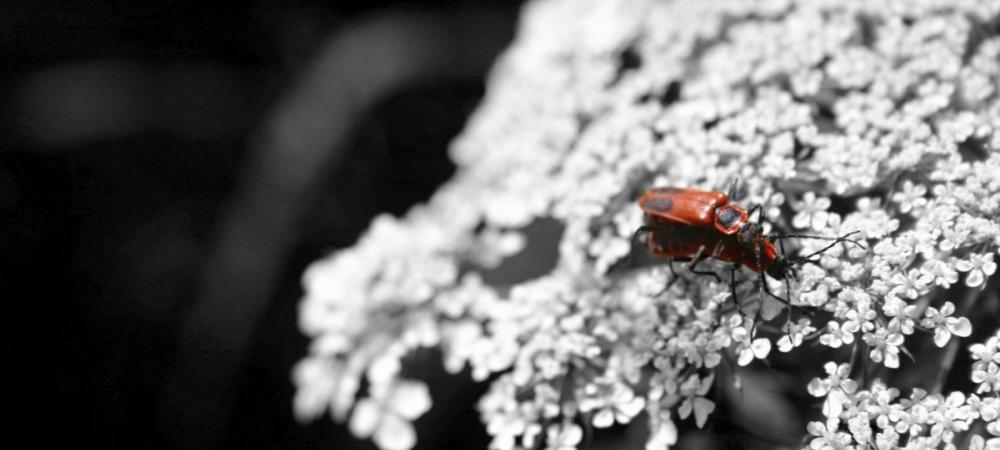Florida’s Lovebugs: What Are They and Why Are They Such A Hazard?

As a resident of Florida, we all know lovebugs are not the most loveable of bugs despite their name. Many lovebugs swarm near roadways and, as a result, cars that drive through clouds of these insects end up with decreased visibility — which can result in potential car accidents. If you’re dealing with a swarm of lovebugs in your home or on your car, you are not alone! Let’s talk about what lovebugs are, where they thrive, and how to get rid of them.
What is a Lovebug?
The name says it all–lovebugs are bugs that are usually paired together with a “mate.” They will attach their bodies to their mate and fly in tandem together. They have black bodies and red heads, and they are typically 6-9 millimeters in length. Although referred to as bugs, these insects are actually flies. They’re more closely related to biting midges and mosquitoes rather than other common bugs like grasshoppers or termites.
Since their time as flies is only a short period of their life cycle, they spend more of their lives as larvae. Females lay their eggs on the ground and can have around 200-300 eggs alone. Yikes! The good news is although these bugs are a nuisance to drivers, they cannot cause any physical harm to you or your pets.
Where Are They Most Common?
Lovebugs have made Florida their home because they thrive in warm, humid climates — commonly on the Gulf Coast. Many times these flies are seen in swarms, most commonly during their two specific mating seasons–once in the spring (April to May), and then again in the late summer (August to September). Lovebugs are most commonly found swarming cars because they are attracted to the gases emitted from vehicles. You’ll most commonly find them swarming fast moving vehicles during the day.
Why Are Lovebugs Such a Hazard?
Although lovebugs don’t bite or sting humans, they can cause harm in several others ways — most notably to your car. Here are the most common ways lovebugs can be a hazard:
- They can affect your visibility while driving. Because they swarm cars so thickly, they can create clouds that can seriously impair your driving visibility. Make sure you drive carefully during their popular mating months, and if you notice swarms of lovebugs on your car while you’re driving, slow down or pull over.
- They cause damage to your car’s engine. While you’re driving, lovebugs can enter the radiator of your car, clogging your vehicle parts. In extreme cases, they can coat the car’s grill to disrupt the engine’s airflow, and cause the car to overheat. Yikes!
- They can damage your car’s paint. What’s more, they can cause even more damage even if they’re already dead. The remains of lovebugs can damage the paint on your car because hours in the sun can cause their bodies to turn acidic. To avoid this, be sure to rinse and remove the lovebugs on the surface of your car within a day.
- They can invade areas with excessive moisture. While these pesky pests are most commonly found on cars, that doesn’t mean they can’t enter your home. Since these humid areas have the potential to grow plants, it creates a food and environment for lovebugs to breed. If you live in an area where lovebugs are common, they can easily make their way into dark, humid areas such as basements, attics, and storage rooms.
- They can disturb your plants. The plants surrounding your home can be breeding and feeding grounds for lovebugs. The female flies search for moist environments, complete with food sources, to lay their larvae — so keep an eye out for them on flower beds.
Ways To Get Rid of Lovebugs
So now that we know exactly what lovebugs are and why they’re such a hazard, let’s talk about how to get rid of them. You know what they say — an ounce of prevention is worth a pound of cure, and when it comes to lovebugs, that statement is true. Here are the best ways to prevent and get rid of lovebugs in Florida:
- Clean your vehicle frequently with warm, soapy water if it is covered in bugs. In order to prevent lovebugs, wax your car prior to their mating season–this will make it harder for them to stick to the exterior.
- Ensure your house has no standing water, in both your yard and storage spaces. Be aware of your home’s humidity to protect your home before it catches an infestation.
- Try natural sprays with essential oils, like peppermint, to repel the flies from your space. A safe, simple (and sometimes effective) approach to say goodbye to lovebugs.
- Clear debris from your yard. These items can also attract a breeding female to lay their larvae.
- Vacuum them up: If lovebugs have found their way into your home, you can try to suck them up via a vacuum.
Get in Touch with Anti-pesto
Get same day pest control when you call before noon in the Greater Tampa Bay Area!
What to Do If You Have Lovebugs
If you do have a lovebug infestation – whether it’s on your car or in your home – know that female lovebugs can only live for three to six days, so your infestation will likely die out naturally on its own. Many pest control companies will not treat for lovebugs, including Anti-Pesto. So if you are dealing with an infestation, we recommend just waiting it out, or sucking them up in a vacuum if you want immediate relief.
If you need other types of pest control in Spring Hill, Lakeland or the surrounding areas, give us a call at 727-524-6333 and see how we can help!
This blog was written by Howard Bright, Owner of Anti-Pesto Bug Killers.
"*" indicates required fields

